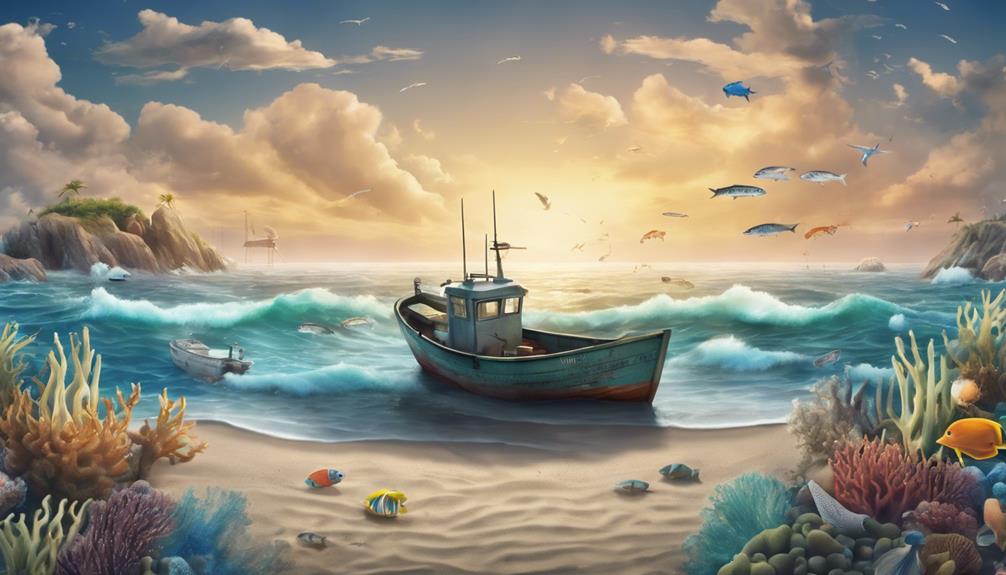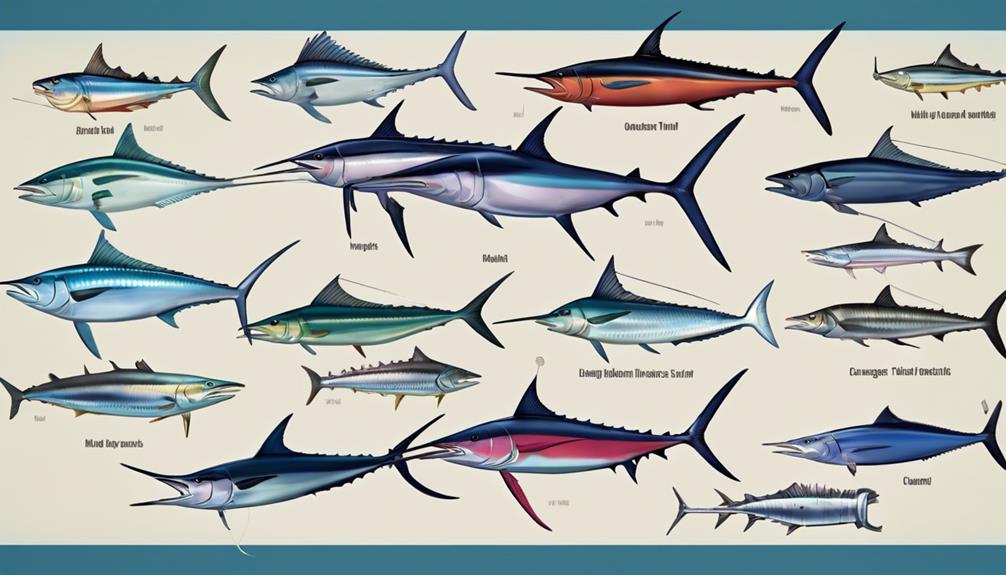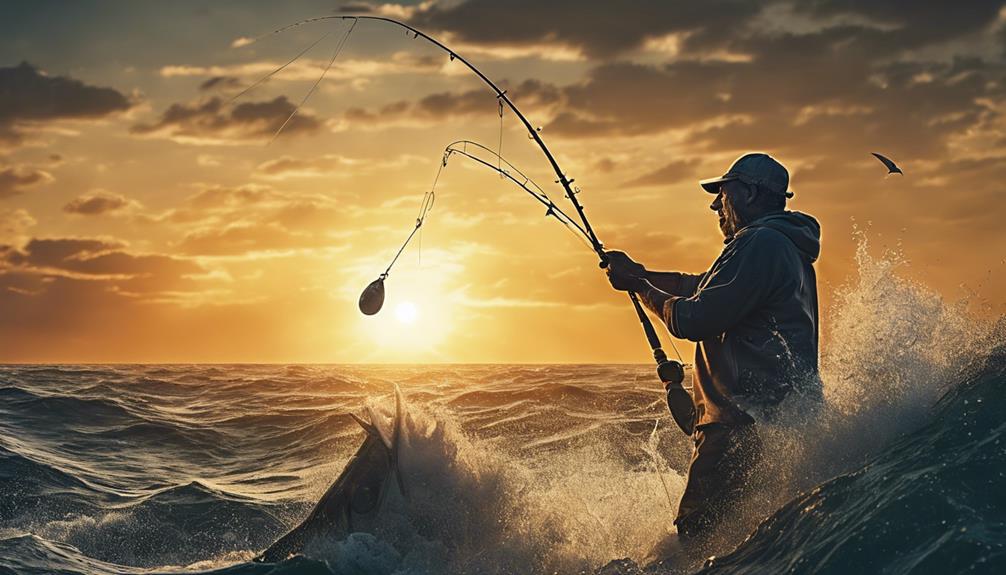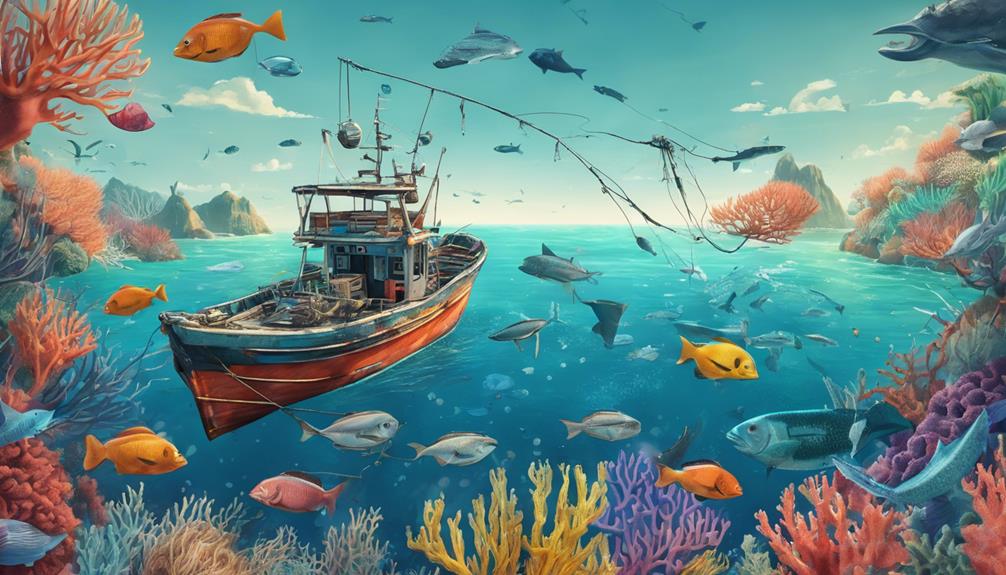Imagine the ocean as a vast, interconnected web, where each fish is a vital thread sustaining the delicate balance of life. Deep sea fishing licenses and regulations are the safety nets keeping this intricate tapestry from unraveling.
But why is this intricate system so crucial? The answer lies in the unseen repercussions of unchecked harvesting. Each rule and requirement serves a purpose beyond mere paperwork; they hold the key to safeguarding our seas for generations to come.
Importance of Deep Sea Fishing Regulations
Understanding why deep sea fishing regulations are crucial can help protect marine ecosystems and ensure sustainable fishing practices. Deep sea fishing has a significant environmental impact on marine ecosystems. Without proper regulations, overfishing can deplete fish populations, disrupt the food chain, and harm delicate marine habitats. By implementing regulations such as catch limits, size restrictions, and protected areas, it's possible to mitigate these negative effects and promote the long-term health of the oceans.
In addition to the environmental benefits, deep sea fishing regulations also provide important economic benefits. Sustainable fishing practices supported by regulations help maintain fish populations at healthy levels, ensuring a stable supply of seafood for commercial fisheries. This stability is essential for the fishing industry as it relies on a consistent availability of fish to sustain businesses and jobs that depend on it. Moreover, regulations can prevent the collapse of fish stocks, which would have devastating economic consequences for fishing communities and industries that rely on a healthy ocean ecosystem.
Conservation Benefits of Licensing
Licensing for deep sea fishing offers significant conservation benefits by regulating and monitoring fishing activities to protect marine resources. By implementing licensing requirements, governments can limit the number of fishing vessels operating in specific areas, preventing overfishing and preserving marine biodiversity. These regulations help maintain the delicate balance of marine ecosystems by ensuring that fish populations aren't depleted beyond sustainable levels.
Effective licensing systems also contribute to the economic sustainability of fishing communities. By preventing overexploitation of fish stocks, licensing helps maintain a stable environment for commercial fishing operations. Sustainable fishing practices supported by licensing lead to long-term economic benefits by ensuring a consistent supply of fish for market demand. This, in turn, supports the livelihoods of fishermen and related industries that rely on healthy marine ecosystems.
Moreover, licensing revenue can be reinvested into marine conservation efforts, such as habitat restoration projects or marine protected areas. This financial support enables governments to implement programs aimed at preserving marine biodiversity and promoting sustainable fishing practices. By valuing marine resources through licensing fees, stakeholders are incentivized to protect the environment for future generations. In essence, deep sea fishing licenses play a crucial role in balancing economic interests with the conservation of marine ecosystems.
Protection of Marine Ecosystems
To safeguard the health and diversity of marine ecosystems, stringent regulations must be enforced to prevent harmful impacts from deep sea fishing activities. Marine biodiversity, which refers to the variety of life forms in the ocean, plays a crucial role in maintaining ecosystem health. Deep sea fishing can have detrimental effects on marine biodiversity, disrupting the delicate balance of underwater ecosystems.
Overfishing, a common consequence of unregulated deep sea fishing, can lead to the depletion of key species in the food chain. This disruption can have cascading effects on other marine organisms, ultimately affecting the overall health of the ecosystem. By implementing and enforcing fishing licenses and regulations, authorities can control the amount and type of fish being caught, helping to preserve marine biodiversity.
Additionally, deep sea fishing practices such as bottom trawling can cause physical damage to seabeds, destroying habitats that support a wide array of marine life. Protecting these habitats is essential for maintaining ecosystem health and ensuring the survival of various species. Fishing regulations can include restrictions on where and how fishing activities can take place, reducing the negative impact on marine ecosystems.
Sustainable Fishing Practices Encouraged
Encouraging the adoption of sustainable fishing practices is crucial for preserving marine ecosystems and ensuring the long-term viability of fishing industries. By implementing sustainable practices, such as using selective gear to minimize bycatch and avoiding overfishing, we can help maintain healthy fish populations and protect the delicate balance of marine ecosystems.
Sustainable practices focus on harvesting fish at a rate that allows the population to replenish itself naturally. This approach ensures that fish stocks remain stable and abundant for future generations. By avoiding destructive fishing methods, such as bottom trawling or using illegal gear, we can protect not only the fish population but also the habitats that support marine life.
When we prioritize sustainable fishing practices, we contribute to the overall health of the oceans. Healthy fish populations play a vital role in the marine food chain, supporting biodiversity and ecosystem resilience. By respecting fishing quotas, size limits, and protected areas, we can help safeguard the balance of marine life and promote sustainable fisheries for years to come.
Monitoring Fish Stocks and Populations
Monitoring fish stocks and populations is essential for ensuring the sustainability of marine ecosystems and the long-term viability of fishing industries. By closely tracking population dynamics and conducting data analysis, fisheries can make informed decisions to prevent overexploitation and preserve the health of marine environments.
- Regular Population Monitoring: Conducting regular assessments of fish populations helps in understanding their abundance, distribution, and reproductive rates. This data is crucial for setting sustainable catch limits.
- Data Analysis for Sustainable Management: Analyzing data on fish stocks enables scientists and policymakers to determine the health of populations and make informed decisions on fishing quotas and conservation measures.
- Early Detection of Declines: Monitoring fish populations allows for the early detection of declines or overfishing trends. This early warning system helps in implementing prompt conservation actions.
- Adapting Management Strategies: Through population monitoring and data analysis, fisheries can adapt their management strategies in real-time based on the changing dynamics of fish stocks, ensuring long-term sustainability.
Effective population monitoring and data analysis are essential tools in the arsenal of sustainable fisheries management. By staying vigilant and proactive in tracking fish populations, we can work towards maintaining healthy marine ecosystems and thriving fishing industries for generations to come.
Prevention of Overfishing
Ensuring sustainable fishing practices is crucial in preventing overfishing and preserving marine ecosystems for future generations. Overfishing occurs when the rate of fishing exceeds the natural reproduction capacity of fish species, leading to a decline in fish population and disrupting the balance of marine ecosystems. The environmental impact of overfishing is far-reaching, affecting not only the targeted fish species but also other marine life that depend on them for food.
When fish populations are depleted due to overfishing, it can result in a cascading effect throughout the food chain, causing imbalances in the ecosystem. For example, a decline in predatory fish species can lead to an increase in their prey, which can then have negative consequences on lower trophic levels. This disruption can have lasting effects on the overall health and biodiversity of marine environments.
Preventing overfishing requires implementing effective management strategies, such as setting catch limits, regulating fishing gear, and establishing marine protected areas. By monitoring fish populations and enforcing sustainable fishing practices, we can help ensure that marine ecosystems remain healthy and productive for future generations to enjoy. It's essential for fishermen, policymakers, and environmentalists to work together to combat overfishing and protect the delicate balance of our oceans.
Enforcement of Size and Catch Limits
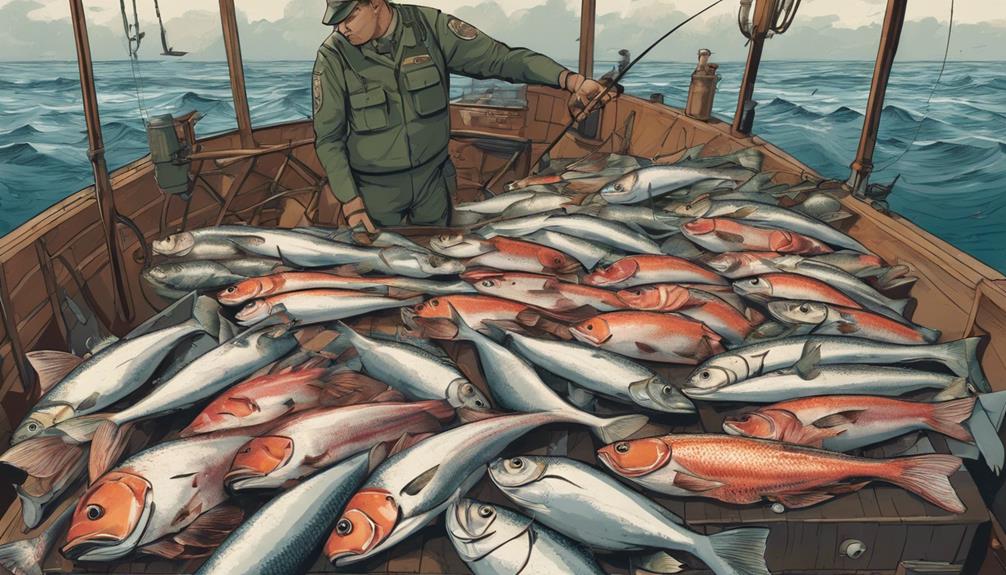
To enforce size and catch limits effectively, fishermen must adhere to regulations set by governing bodies. Compliance rates play a crucial role in determining the enforcement effectiveness of these regulations. Here are some key points to consider:
- Education: Providing clear and accessible information about size and catch limits is essential. Educating fishermen about the reasons behind these regulations can help increase compliance rates.
- Monitoring: Regular monitoring of fishing activities is necessary to ensure that fishermen are staying within the set limits. This can involve on-site inspections, electronic monitoring systems, or reporting requirements.
- Penalties: Enforcing penalties for non-compliance is a vital aspect of ensuring that size and catch limits are respected. Penalties can range from fines to license suspensions, depending on the severity of the violation.
- Community Involvement: Engaging the fishing community in the enforcement process can lead to higher compliance rates. By involving fishermen in decision-making processes and seeking their input, governing bodies can foster a sense of ownership and responsibility within the community.
Contribution to Research and Data Collection
Contribute valuable insights to research and data collection by reporting your fishing activities accurately and promptly. Your contribution as a deep-sea fisherman plays a crucial role in advancing scientific research related to marine ecosystems and fisheries management. By adhering to fishing regulations and accurately documenting your catches, you provide scientists and resource managers with essential data for assessing fish populations, biodiversity, and ecosystem health.
Your contribution to scientific research through diligent reporting enables experts to monitor changes in fish stocks over time. This data is vital for understanding the impact of fishing activities on marine species and ecosystems, helping to inform sustainable management practices. By accurately documenting the species, sizes, and quantities of fish caught, you contribute to the development of effective conservation strategies aimed at maintaining healthy fish populations and preserving biodiversity in the ocean.
Furthermore, your active participation in data collection efforts enhances the accuracy and reliability of research outcomes. Scientists rely on comprehensive and precise information to conduct meaningful analyses and draw scientifically sound conclusions. Your contribution as a responsible angler supports the integrity of research findings and facilitates informed decision-making processes for sustainable fisheries management. By reporting your fishing activities conscientiously, you contribute directly to the advancement of scientific knowledge and the preservation of marine resources for future generations.
Frequently Asked Questions
How Do Deep Sea Fishing Licenses and Regulations Vary From Country to Country?
In different countries, deep sea fishing licenses and regulations can vary significantly. Licensing requirements and enforcement methods differ, impacting who can fish and how.
Conservation efforts and sustainability practices also vary, affecting the protection of marine resources. Understanding these differences is crucial for maintaining a balance between economic interests and environmental conservation.
Are There Any Specific Regulations in Place to Protect Endangered Species During Deep Sea Fishing?
When you're out deep sea fishing, it's crucial to know that specific regulations are in place to protect endangered species.
Conservation efforts play a significant role in safeguarding these vulnerable marine creatures from overfishing or harm.
How Do Deep Sea Fishing Regulations Impact Local Fishing Communities and Economies?
Deep sea fishing regulations can have a significant impact on local fishing communities and economies. These rules affect how much, when, and what can be caught, which influences the livelihoods of fishermen and the availability of fish in the market.
What Role Do Technology and Advancements in Fishing Gear Play in Enforcing Regulations?
Advancements in enforcement technology and gear technology have revolutionized how regulations are upheld. Monitoring systems now track fishing activity more accurately, ensuring compliance. These tools play a crucial role in protecting marine resources and maintaining sustainable fishing practices.
How Do Deep Sea Fishing Regulations Address the Issue of Bycatch and Accidental Capture of Non-Target Species?
When deep sea fishing regulations focus on reducing bycatch, they help promote sustainable practices.
By implementing measures to minimize accidental capture of non-target species, these regulations safeguard marine ecosystems and support the balance of aquatic populations.
Through careful monitoring and enforcement, regulations ensure that fishing activities are conducted responsibly, preserving biodiversity and maintaining the health of the ocean environment for future generations.
Conclusion
In conclusion, deep sea fishing licenses and regulations are crucial for the conservation of marine ecosystems, promoting sustainable fishing practices, and preventing overfishing. By enforcing size and catch limits, monitoring fish populations, and contributing to research, these regulations help to ensure the long-term health of our oceans.
So next time you head out for a deep sea fishing adventure, make sure to follow the rules and do your part to protect our precious marine resources.
